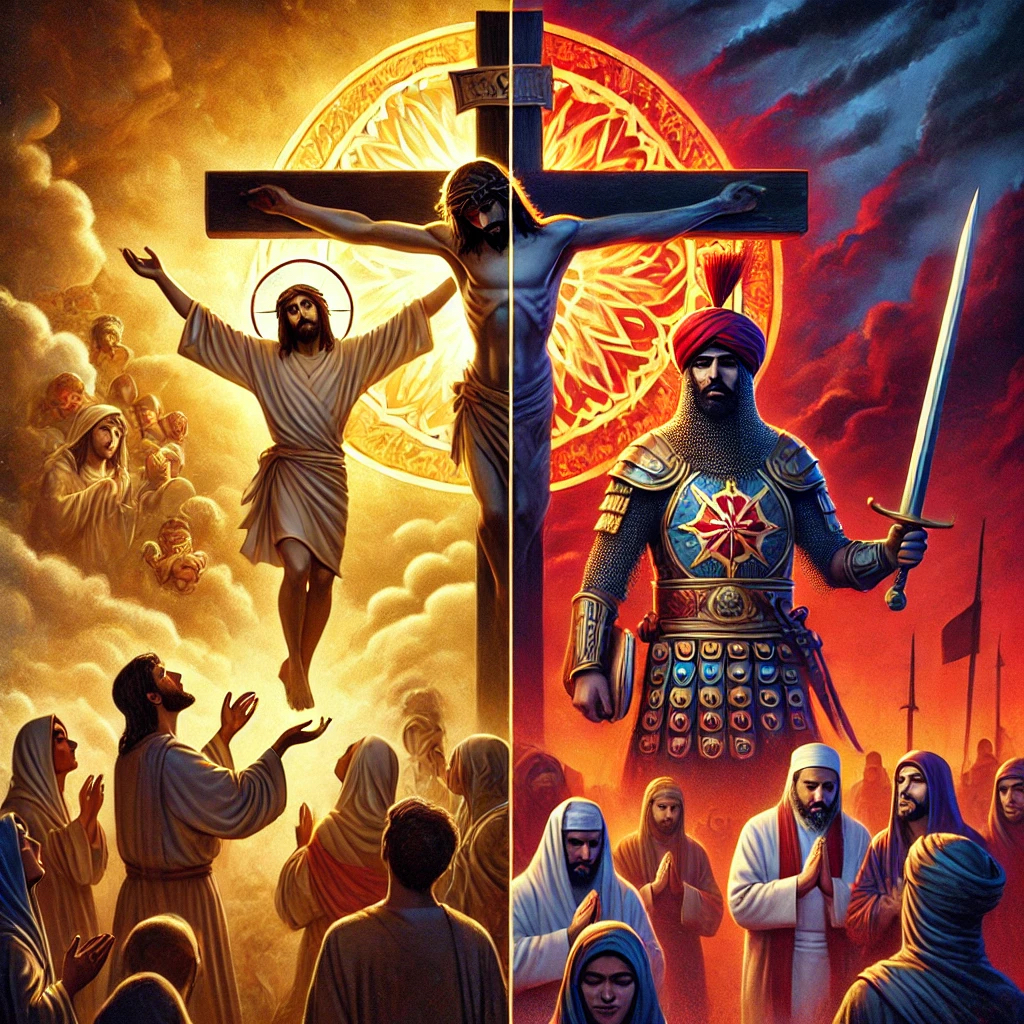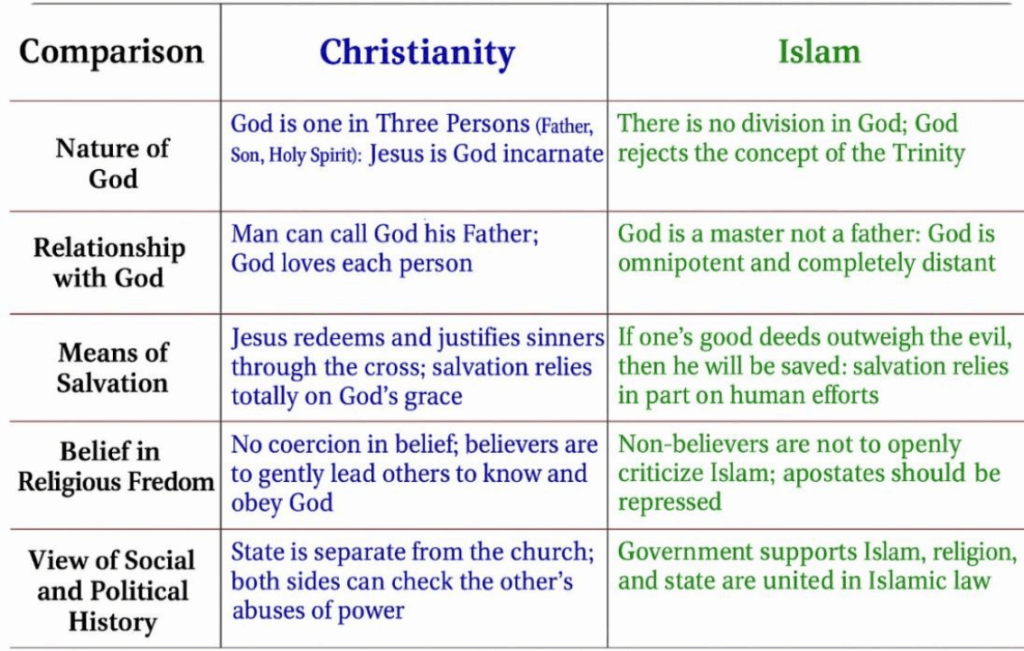——基督教与伊斯兰教的根本区别
“耶稣基督为你去死” 与 “真主安拉让你为他去死” 的对比,揭示了基督教与伊斯兰教在神的本质、人与神的关系、救赎方式、对待异见者的态度、信仰自由以及社会影响方面的根本不同。这些差异不仅涉及神学问题,还深刻影响着两种信仰在历史发展、社会文化、法律制度上的表现。本文围绕五个关键问题展开详细分析,并引用《圣经》和《古兰经》的相关经文加以佐证:
- 神的本质:主动牺牲的爱 vs. 绝对要求的主权
- 救赎方式:恩典与信仰 vs. 顺服与功德
- 对待异见者的态度:宽恕 vs. 镇压
- 信仰自由:福音的开放性 vs. 胁迫与暴力控制
- 历史与现实:基督教社会 vs. 伊斯兰社会的发展
一、神的本质:主动牺牲的爱 vs. 绝对要求的主权
基督教:神主动牺牲自己,表达无条件的爱
“惟有基督在我们还作罪人的时候为我们死,神的爱就在此向我们显明了。”(罗马书 5:8)“神爱世人,甚至将他的独生子赐给他们,叫一切信他的,不至灭亡,反得永生。”(约翰福音 3:16)
基督教的神以牺牲自己表达爱,耶稣基督甘愿走向十字架,不是因人的顺服,而是因祂主动愿意拯救世界。祂的爱是无条件的,不是因人的行为,而是出于神的恩典。
伊斯兰教:安拉要求绝对顺服,掌控人的命运
“安拉命令你们服从他和使者(穆罕默德);你们若违抗,就必遭受惩罚。”(《古兰经》4:59)“信道的人们啊!你们应当敬畏安拉,应当顺从他的使者。”(《古兰经》8:1)
伊斯兰教的神是绝对的主宰,祂要求信徒无条件顺服,否则就是不信道者,将受到审判。在伊斯兰教中,人类的职责是遵从安拉的律法,而非与神建立爱的关系。
对比:
- 基督教的神主动爱人,甘愿为人牺牲。
- 伊斯兰教的神要求人绝对顺服,否则面临惩罚。
二、救赎方式:恩典与信仰 vs. 顺服与功德
基督教:救赎是出于恩典,唯靠信心
“你们得救是本乎恩,也因着信;这并不是出于自己,乃是神所赐的;也不是出于行为,免得有人自夸。”(以弗所书 2:8-9)“所以我们看定了,人称义是因着信,不在乎遵行律法。”(罗马书 3:28)
基督教强调,人的善行无法带来自我救赎,救恩是神的礼物,单单靠信耶稣基督才能得救。行为虽重要,但不是获得救赎的条件,而是信仰的结果。
伊斯兰教:救赎依赖人的功德和服从
“谁行善,他将得十倍的报酬;谁作恶,他将仅受相应的惩罚。”(《古兰经》6:160)“那日,人们的善行与恶行将被称量,谁的善行多,谁就进入乐园。”(《古兰经》23:102-103)
伊斯兰教的救赎基于人的行为,信徒必须积累足够的善行才有希望进入天堂。如果恶行大于善行,安拉可以决定将人投入地狱,救赎并非出于神的恩典,而是人的努力。
对比:
- 基督教:救恩是神的礼物,信靠耶稣即可得救。
- 伊斯兰教:救赎依赖人的行为和顺服,人的功德决定命运。
三、对待异见者的态度:宽恕 vs. 镇压
基督教:宽恕仇敌,不强迫信仰
“只是我告诉你们,要爱你们的仇敌,为那逼迫你们的祷告。”(马太福音 5:44)“你们要谨慎,无论是谁都不可以恶报恶。或是彼此相待,或是待众人,常要追求良善。”(帖撒罗尼迦前书 5:15)
耶稣基督教导门徒,即使面对仇敌和逼迫,也要以爱回应,而不是用暴力对抗。基督徒被要求以宽恕和仁爱面对不同信仰的人,而不是迫使他们接受基督教。
伊斯兰教:消灭异教徒,强迫服从
“你们当杀死所有不信道者,直到他们信安拉。”(《古兰经》9:5)“与不信道的人战斗,直到他们愿意交纳人头税,并且完全顺服。”(《古兰经》9:29)
伊斯兰教的经典明确指示信徒对抗非穆斯林,甚至在某些情况下允许使用武力迫使他们服从伊斯兰法。在某些伊斯兰国家,不信者会受到法律或社会层面的迫害。
对比:
- 基督教:鼓励宽恕,不以暴力回应仇敌。
- 伊斯兰教:鼓励对抗异教徒,有时甚至诉诸暴力。
四、信仰自由:福音的开放性 vs. 胁迫与暴力控制
基督教:信仰自由,不强迫皈依
“主就是那灵,主的灵在哪里,那里就得以自由。”(哥林多后书 3:17)“于是,耶稣对门徒说:“若有人要跟从我,就当舍己,背起他的十字架,来跟从我。”(马太福音 16:24)
基督教强调信仰必须出于自愿,耶稣邀请人来信祂,但不会强迫任何人皈依。基督教世界尊重个人信仰的自由,任何人都有权接受或拒绝福音。
伊斯兰教:离教者应被处死,强迫信仰
“凡离开伊斯兰的人,你们要杀死他。”(布哈里圣训 9:57)“与不信者战斗,直到他们归信安拉。”(《古兰经》9:73)
伊斯兰教在许多国家仍然执行“离教死刑”,信徒若改信基督教或其他宗教,可能会被判处死刑。许多伊斯兰国家的法律严格限制信仰自由,禁止传教活动。
对比:
- 基督教:信仰自由,允许人自行选择信仰。
- 伊斯兰教:强制信仰,禁止穆斯林改信其他宗教。
五、历史与现实:基督教社会 vs. 伊斯兰社会的发展
基督教:推动自由民主,尊重人权
“并不分犹太人、希腊人、自主的,为奴的、或男或女,因为你们在基督里都成为一了。”(加拉太书 3:28)
基督教社会发展了自由民主制度,提倡平等和人权。欧美国家在基督教文化影响下建立了现代法治社会,保护信仰自由和个人权利。
伊斯兰教:宗教专制,压制个人自由
“凡不服从安拉律法者,皆是不信道者。”(《古兰经》5:44)
伊斯兰世界至今仍受沙里亚法(伊斯兰律法)控制,许多国家限制个人自由,女性权利低下,宗教极端主义盛行。信仰伊斯兰的人几乎无法自由皈依其他宗教。
对比:
- 基督教:发展民主自由,保护人权。
- 伊斯兰教:实行宗教专制,限制自由。
可以视为结论的结论
基督教的神是爱与牺牲的神,赐予人自由;伊斯兰教的神是主宰与掌权者,要求人完全顺服。二者本质不同,安拉根本不是与圣经所示的同一位神!

最后:基督教的爱与自由 vs. 伊斯兰的顺服与控制
通过对比基督教与伊斯兰教在神的本质、救赎方式、对待异见者的态度、信仰自由及社会发展上的不同,我们可以清楚地看到两者并非同一信仰体系,也不是在敬拜同一位神。基督教的核心是神主动的爱,耶稣基督以牺牲自己来拯救世人,并赐予他们完全的自由;而伊斯兰教的核心是安拉的绝对主权,要求信徒无条件顺服,甚至不惜为他而战。
在基督教信仰中,人因信得救,神的恩典不取决于人的善行,而是出于神无条件的爱;但在伊斯兰教中,救赎则是基于人的顺服和功德,若善行不足,便可能被审判入地狱。基督教鼓励信徒宽恕仇敌、爱人如己,而伊斯兰教却在《古兰经》中鼓励信徒消灭异教徒,镇压异见者。基督教社会发展出了自由、民主、人权等普世价值,而伊斯兰社会则长期受沙里亚法控制,限制个人自由,女性权利低下,离教者甚至可能被处死。
最终,我们可以得出结论:基督教的神是充满爱和牺牲的救主,给予人自由;而伊斯兰教的神是要求顺服的主宰,给予人律法的约束。二者的神学逻辑完全不同,根本不是同一位神。信仰基督带来自由和生命,而顺从安拉则意味着控制和约束,甚至战争。因此,面对这两种信仰,我们需要深入思考:我们是要接受神的恩典,活在基督的自由之中,还是愿意受律法与宗教极端主义的控制,被迫顺从?

附问题思考:伊斯兰教是否是邪教?
1. 什么是“邪教”?
在学术和法律层面,“邪教”通常指具有以下特征的宗教或组织:
a.极端排他性:声称只有自己的信仰是真理,其他信仰或无信仰者皆为敌人。
b.思想控制:要求绝对顺从,不允许质疑,限制信徒的思想和行为。
c.强制性行为:利用威胁、暴力、洗脑等手段强迫人加入或不允许离开。
d.破坏社会稳定:煽动暴力、仇恨或恐怖活动,对社会造成威胁。
2. 伊斯兰教的基本定义与分类
伊斯兰教是全球第二大宗教,拥有约19亿信徒。其内部涵盖多个派别:
a.主流伊斯兰教(如逊尼派、什叶派):大多数信徒遵循传统教义,并非所有人都持极端立场。
b.伊斯兰极端主义(如塔利班、ISIS、基地组织):这些团体的思想和行动符合邪教的定义,被广泛视为恐怖组织。
因此,我们需要区分主流伊斯兰教和伊斯兰极端主义,不能一概而论。
3. 下面只是提出结论供参考,如下:
1、如果以“主流伊斯兰教”来看,虽然排他性较强,但不能简单定义为邪教。
2、如果以“伊斯兰极端派别”(如ISIS、塔利班)来看,则符合邪教所有标准。
3、在一些伊斯兰国家,伊斯兰教已经成为政权工具,限制信仰自由,导致其表现出邪教特征。
4、伊斯兰教与其他宗教相比,在思想控制、强制信仰、对异见者态度等方面更接近邪教定义。
所以说,虽然伊斯兰教整体上不能完全被定性为邪教,但其极端派别和某些国家的伊斯兰教执行方式,确实带有邪教性质。

Jesus Died for You vs. Allah Made You Die for Him
—The Fundamental Differences Between Christianity and Islam
The contrast between “Jesus Christ died for you” and “Allah made you die for Him” reveals the fundamental differences between Christianity and Islam in regard to the nature of God, the relationship between God and man, the mode of redemption, the attitude toward dissenters, religious freedom, and societal impact. These differences not only involve theological issues but also profoundly affect the historical development, cultural manifestations, and legal systems of the two faiths. This article provides a detailed analysis centered on five key issues, citing relevant scriptures from both the Bible and the Quran:
- The Nature of God: Voluntary, Sacrificial Love vs. Absolute Demand for Sovereignty
- The Mode of Redemption: Grace and Faith vs. Obedience and Merits
- Attitude Toward Dissenters: Forgiveness vs. Suppression
- Religious Freedom: The Openness of the Gospel vs. Coercion and Violent Control
- History and Reality: The Development of Christian Societies vs. Islamic Societies
1. The Nature of God: Voluntary, Sacrificial Love vs. Absolute Demand for Sovereignty
Christianity: God’s Love Expressed Through Voluntary Sacrifice
“For while we were still sinners, Christ died for us, demonstrating God’s love for us.” (Romans 5:8) “For God so loved the world that he gave his one and only Son, that whoever believes in him shall not perish but have eternal life.” (John 3:16)
In Christianity, God expresses His love through self-sacrifice. Jesus Christ willingly embraced the cross—not because of human obedience but out of His proactive desire to save the world. His love is unconditional, not based on human actions but solely on God’s grace.
Islam: Allah Demands Absolute Obedience and Controls Men’s Fate
“O you who have believed, obey Allah and obey the Messenger, and those in authority among you. And if you dispute over anything, refer it to Allah and the Messenger, if you should believe in Allah and the Last Day. That is the best [way] and best in result.” (Quran 4:59) “O believers, fear Allah and obey his Messenger.” (Quran 8:1)
In Islam, Allah is the absolute sovereign. He demands unconditional obedience from His followers, and any disobedience marks one as an unbeliever who will face judgment. For Muslims, humanity’s duty is to follow Allah’s laws rather than to build a relationship with God based on love.
Comparison:
• In Christianity, God proactively loves people and is willing to sacrifice Himself for them.
• In Islam, God requires absolute obedience, with the consequence of punishment for disobedience.
2. The Mode of Redemption: Grace and Faith vs. Obedience and Merits
Christianity: Redemption Is a Gift of Grace Through Faith
“For it is by grace you have been saved, through faith—and this is not from yourselves, it is the gift of God—not by works, so that no one can boast.” (Ephesians 2:8-9) “For we maintain that a person is justified by faith apart from the works of the law.” (Romans 3:28)
Christianity emphasizes that human good works cannot earn salvation; redemption is a gift from God, attainable solely through faith in Jesus Christ. While actions are important, they are the result of faith rather than the prerequisite for redemption.
Islam: Redemption Depends on Human Merits and Obedience
“Whoever does righteous deeds, whether male or female, while being a believer—those will enter Paradise and will not be wronged, [even as much as] the speck on a date seed.” (Quran 6:160) “And on the Day the Hour will be established, the criminals will be exposed, and their deeds will be weighed; whoever has more good than evil will be in Paradise.” (Quran 23:102-103)
In Islam, redemption is based on human actions; believers must accumulate enough righteous deeds to earn entrance into Paradise. If evil outweighs good, Allah may decree punishment in Hell. Salvation is not granted purely out of God’s grace but is contingent on human effort and obedience.
Comparison:
• Christianity teaches that salvation is God’s gift and is obtained through faith in Jesus.
• Islam teaches that redemption depends on a person’s deeds and obedience, with one’s merits determining their fate.
3. Attitude Toward Dissenters: Forgiveness vs. Suppression
Christianity: Forgive Your Enemies and Do Not Force Faith
“But I tell you, love your enemies and pray for those who persecute you.” (Matthew 5:44) “Be careful, then, how you treat each other. If you do what is right, you will have no enemies. But if you do what is wrong, you will have enemies, be they individuals or groups.” (1 Thessalonians 5:15)
Jesus taught His disciples to respond to enemies and persecutors with love rather than violence. Christians are called to approach those of different faiths with forgiveness and compassion rather than forcibly converting them.
Islam: Destroy the Infidels and Enforce Obedience
“Then, when you have overcome them, kill them wherever you find them…” (Quran 9:5) “Fight against those who do not believe in Allah or in the Last Day until they pay the jizyah with willingness while they are humbled.” (Quran 9:29)
Islamic scripture clearly instructs believers to combat non-Muslims and, in some cases, to use force to make them comply with Islamic law. In certain Islamic countries, non-believers are subjected to legal and social persecution.
Comparison:
• Christianity encourages forgiveness and non-violent responses to opponents.
• Islam, according to its scriptures, advocates fighting against infidels, sometimes even resorting to violence.
4. Religious Freedom: The Openness of the Gospel vs. Coercion and Violent Control
Christianity: Religious Freedom and Voluntary Conversion
“For the Lord is the Spirit, and where the Spirit of the Lord is, there is freedom.” (2 Corinthians 3:17) “Then Jesus said to his disciples, ‘If anyone would come after me, let him deny himself and take up his cross and follow me.’” (Matthew 16:24)
Christianity stresses that faith must be a matter of personal choice; Jesus invites individuals to believe in Him without forcing conversion. In Christian culture, individual freedom of belief is respected, and everyone has the right to accept or reject the gospel.
Islam: Apostasy Is Punishable by Death and Faith Is Coerced
“Whoever changes his religion, kill him.” (Hadith from Sahih Bukhari 9:57) “Fight those who do not believe in Allah until they give the jizyah willingly.” (Quran 9:73)
In many Islamic countries, apostasy (leaving Islam) is punishable by death, and believers who convert to another religion may face severe legal consequences. Islamic law in these regions strictly controls religious freedom and proselytization is forbidden.
Comparison:
• Christianity supports religious freedom by allowing individuals to choose their faith voluntarily.
• Islam imposes compulsory faith, with severe penalties for apostasy and restrictions on religious freedom.
5. History and Reality: The Development of Christian Societies vs. Islamic Societies
Christianity: Championing Freedom, Democracy, and Human Rights
“There is neither Jew nor Greek, slave nor free, male nor female, for you are all one in Christ Jesus.” (Galatians 3:28)
Christian societies have developed modern democratic institutions and respect human rights. In regions influenced by Christian values, such as Europe and North America, modern legal systems protect religious freedom and individual rights.
Islam: Religious Totalitarianism That Suppresses Personal Freedom
“Whoever does not obey Allah’s laws is not a believer.” (Quran 5:44)
The Islamic world, in many cases, remains under the strict control of Sharia law. In many Islamic countries, personal freedoms are limited, women’s rights are curtailed, and even apostasy may be punishable by death.
Comparison:
• Christianity has fostered the development of democratic, free societies that protect human rights.
• Islam, in some regions, is associated with religious totalitarianism that limits personal freedoms.
Concluding Synthesis
Christianity’s God is the God of love and sacrifice who grants freedom. In contrast, the Islamic God demands obedience and rules over humanity with absolute authority. Their natures are fundamentally different—Allah is not the same God described in the Bible.

Finally: Christianity’s Love and Freedom vs. Islam’s Obedience and Control
Through a comparison of the nature of God, the mode of redemption, attitudes toward dissent, religious freedom, and societal development, we clearly see that the two are not part of the same faith system nor do they worship the same God. At the core of Christianity is a God who loves actively—Jesus Christ sacrificed Himself to save humanity and grant them true freedom. On the other hand, at the heart of Islam is an all-powerful Lord who demands absolute obedience, even to the point of war.
In the Christian faith, salvation comes through belief; God’s grace is not earned by human deeds but is given out of unconditional love. By contrast, in Islam, redemption is based on a person’s obedience and merits; insufficient good deeds may even lead to judgment and damnation. Christianity encourages believers to forgive their enemies and love one another, while the Quran is interpreted by some to call for the eradication of infidels and suppression of dissenters. Christian societies have evolved into bastions of freedom, democracy, and human rights, whereas Islamic societies in many regions continue under strict Sharia control, with limited personal freedoms, diminished rights for women, and even the death penalty for apostates.
Ultimately, we arrive at the conclusion: the God of Christianity is a savior full of love and sacrifice who grants freedom and life, whereas the God of Islam demands obedience and imposes a rigid legal order. Their theological logics are entirely different and do not represent the same deity. Embracing Christ brings freedom and life, but obeying Allah means accepting control, constraint, and even conflict. Faced with these two faiths, we must deeply consider: do we choose to accept God’s grace and live in the freedom of Christ, or are we willing to be controlled by the law and religious extremism?

Additional Reflections: Is Islam a Cult?
- What Is a “Cult”?
At academic and legal levels, the term “cult” typically refers to a religious group or organization that exhibits the following characteristics:
a. Extreme Exclusivity: Claiming that only their belief is the truth and regarding other faiths or the non-believers as enemies.
b. Mind Control: Demanding absolute obedience, not permitting questioning, and restricting the thoughts and behaviors of its followers.
c. Coercive Practices: Using threats, violence, brainwashing, and other means to force people to join or to prevent them from leaving.
d. Disruption of Social Stability: Inciting violence, hatred, or terror, and posing a threat to society.
- Basic Definition and Classification of Islam
Islam is the world’s second-largest religion, with roughly 1.9 billion followers. It encompasses multiple sects:
a. Mainstream Islam (such as Sunni and Shia): The majority of believers follow traditional doctrines and do not hold extreme views.
b. Islamic Extremism (such as the Taliban, ISIS, al-Qaeda): These groups’ ideologies and actions meet the criteria of a cult and are widely regarded as terrorist organizations. Therefore, it is necessary to distinguish between mainstream Islam and Islamic extremism rather than generalizing.
- A Few Concluding Points for Consideration:
- When considering “mainstream Islam,” although it exhibits strong exclusivity, it cannot be simply defined as a cult.
- However, when considering “Islamic extremist factions” (such as ISIS or the Taliban), they fulfill all the criteria of a cult.
- In some Islamic countries, Islam has been politicized as a tool of governance that limits religious freedom and thereby shows cult-like characteristics.
- Compared with other religions, Islam in certain contexts— through mind control, enforced conformity, and its attitude toward dissent—bears more resemblance to the definition of a cult.
Thus, while Islam as a whole cannot be completely classified as a cult, its extremist factions and the manner in which Islam is sometimes executed in certain countries do indeed exhibit cult-like features.

发表回复